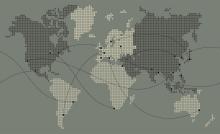Trade

IN MID-DECEMBER, trade talks involving almost every country in the world closed in Nairobi. Did anyone hear the door slam?
Previous negotiations of the World Trade Organization (WTO) have been sites of furious protest and resistance by tens of thousands of people, including small farmers, trade unionists, anti-globalization activists, and faith and development organizations. (The 1999 negotiations were called the “battle in Seattle” for good reason.)
While the Nairobi meetings held some similarities to previous WTO negotiations—fears that no agreement would be reached and entrenched positions by the global North and South—other aspects were entirely different, including the way civil society is organized for engagement.
In the last two years, we have witnessed the rise of megaregional trade deals. The Transatlantic Trade and Investment Partnership (T-TIP) between the U.S. and the European Union is one example, but there are many others under negotiation. The Comprehensive Economic and Trade Agreement between Canada and the E.U. has been finalized and the text is awaiting parliamentary agreements some time in 2016. The Trans-Pacific Partnership (TPP) between the U.S. and many Pacific Rim countries was agreed upon in October 2015 and is waiting for governments to ratify it. The Trade In Services Agreement is in its 15th round of negotiations involving more than 50 countries.
These deals have many similarities. They are designed to open up new markets for global corporations and create the conditions for them to be as lucrative as possible. Perceived “barriers” to trade, such as fair labor standards, food safety regulations, and publicly provided services, are to be reduced or removed.
Additional legal protections to safeguard corporate profits from the effects of national government policies (such as raising the minimum wage or introducing plain-packaging on tobacco products) will be introduced. And, of course, the negotiations are held in secret, away from democratic scrutiny.
THE ANONYMOUS DEATH threats phoned to Archbishop Pedro Barreto and others in March told them to stop speaking out about the foreign-owned metals smelting plant in La Oroya, Peru.
Barreto, a Catholic archbishop of the Andean region that includes La Oroya, has been a leading advocate for the health of the 35,000-person town, which the plant has made one of the world’s most contaminated places: 99 percent of children there have dangerous levels of lead in their blood.
However, in an unconscionable move made possible by the 2009 U.S.-Peru trade agreement, it is the polluter who claims to be the victim. The massive New York-based holding company Renco Group Inc., whose subsidiary Doe Run Peru owns the smelter, last year filed an $800 million trade-tribunal lawsuit against the Peruvian government, claiming it violated the company’s rights by enforcing environmental regulations in La Oroya.
It’s one of a growing wave of such arbitrations being filed all over the world by extractive-industry foreign investors. In a similar case, the transnational corporation Pacific Rim has filed a $70 million case against El Salvador, after local communities and activists—four of whom have been murdered—opposed gold mining that could contaminate one of the country’s largest rivers.
The suits circumvent nations’ environmental laws by exploiting so-called “investors’ rights” chapters of trade agreements; such provisions are common in bilateral trade agreements, such as the U.S.-Peru pact, and regional agreements such as NAFTA.

Whatever President Obama does at the upcoming Summit of the Americas in Cartagena, Colombia this weekend may not be front-page news in the U.S—but for many Colombians trying to make an honest living in their homeland, it could just be Obama's "Mission Accomplished" banner moment.
President George W. Bush's May 2003 speech in front of a giant "Mission Accomplished" sign was, to put it mildly, a premature declaration of triumph in the U.S. war with Iraq, an enterprise that was a bad idea in the first place. In Cartagena this weekend, word is that Obama may declare that, after one year of a promised four-year plan, Colombia has met its commitments to crack down on offenses against Colombian workers' rights and lives.

Chris Hedges' statement on Occupy Wall Street read in part:
As part of the political theater that has come to replace the legislative and judicial process, the Securities and Exchange Commission agreed to a $550 million settlement whereby Goldman Sachs admitted it showed "incomplete" information in marketing materials and that it was a "mistake" to not disclose the nature of its portfolio selection committee. This fine was a payoff to the SEC by Goldman Sachs of about four days' worth of revenue, and in return they avoided going to court. CEO Lloyd Blankfein apparently not only lied to clients, but to the subcommittee itself on April 27, 2010, when he told lawmakers: "We didn't have a massive short against the housing market, and we certainly did not bet against our clients." Yet, they did.
Rick Perry was recently asked by a nine-year-old "If you were a super hero, what kind of super hero would you be?" His answer to the child's benign question was simultaneously predictable and profound: Superman.
Did anyone else get the feeling, as we watched weather reporters wave their arms frantically in swirling motions across oversized maps of the eastern seaboard -- with their eyes bulging as they pushed out whole paragraphs without a single breath for a period -- that this was all hype?
Last weekend, as Irene passed over town after town in the mid-Atlantic, memories of Katrina did not materialize. By the time Irene huffed over New York City on Sunday morning, and the flood of the century was actually just a really big puddle in Battery Park and a floating lifeguard stand in Long Beach, my fear had transformed into complacency. From there I became cynical. By Sunday afternoon I found myself watching the weatherman's bulging eyes as he repeated the mantra of the day: "It's not as bad as we thought it would be, but it's not over." And I thought: "Boy, they'll do anything for ratings."
But it wasn't all hype.
 Seeking justice for the oppressed. Working to end the connection of child slavery to chocolate. Helping heal a devastated Haiti. Mobilizing young people to respond to a story of redemption by imaginatively working to build a better world. I think many of us Christians would hope that those words were describing the work of the body of Christ, intent on following the path of Jesus Christ in this world. In this case, they are actually descriptions of the Harry Potter Alliance. That's right -- the Harry Potter Alliance.
Seeking justice for the oppressed. Working to end the connection of child slavery to chocolate. Helping heal a devastated Haiti. Mobilizing young people to respond to a story of redemption by imaginatively working to build a better world. I think many of us Christians would hope that those words were describing the work of the body of Christ, intent on following the path of Jesus Christ in this world. In this case, they are actually descriptions of the Harry Potter Alliance. That's right -- the Harry Potter Alliance.
A U.S.-Colombia trade pact would not address, and might even reward, paramilitary violence.
Tomatoes. Uganda. Fair Trade. Here's a little round up of links from around the Web you may have missed this week:
- Are you living in a food desert? Here's a map that will tell you.
- Stop the hate in Uganda.
- This Saturday is World Fair Trade day. (What is fair trade, you ask?)
- The U.S. Conference of Catholic Bishops asks Senator John Boehner for a budget that "reduces future deficits, protects the poor and vulnerable people, advances the common good, and promotes human life and dignity."
- Continue praying for Egypt.
- Mark Bittman visits Immakolee, Florida, America's tomato capital.
- Easy Korean cooking for beginners.
- A cheerful video for you: coffee time.
Across the United States, there is a new movement emerging to dramatize the immorality of corporate tax dodging in the face of drastic budget cuts.
